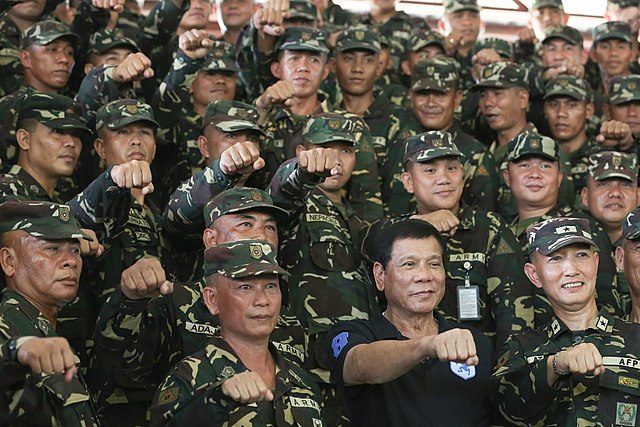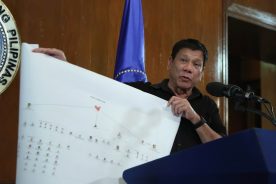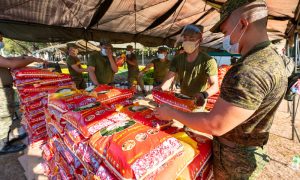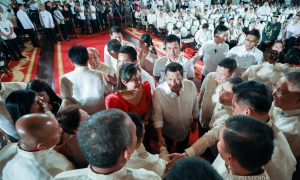According to the World Health Organisation, the first case of COVID-19 was confirmed in the Philippines on 20 January 2020. More than a year after, there are now more than 600,000 confirmed cases, nearly 13,000 deaths and a surge of 5000 new cases in one day. Approximately 41 percent of the total number of confirmed cases are from the National Capital Region (NCR), where Manila is located. The death toll from Duterte’s Drug War since July 2016 ranges from a conservative estimate of 8,663 people according to the UN Human Rights Council, to possibly thrice as high based on statements from the Philippine Commission on Human Rights. The official record from the Philippine Drug Enforcement Agency (PDEA), the agency implementing Duterte’s Drug War, is at 6,011 deaths from July 2016 to December 2020.
Alarmingly, the national pandemic response is even being harnessed in the service of the Drug War with extrajudicial killings registering a 50 percent increase between April and July 2020. Both COVID-19 related deaths and extrajudicial killings linked with the War on Drugs have been popularly represented by the Duterte government as disconnected from, or outside of, all the range and repertoires of repression at the state’s disposal.
Yet prior to the pandemic, Filipinos were already primed for and inoculated to mass loss of life and human rights violations, precisely because of the militarism that has been the logic of security under Duterte’s rule. We can understand everyday life in the Philippines as part of an ongoing continuum of violence, from the first day that Duterte launched his war on drugs, to the present militarised response to the health crisis. The Philippines was already suffering a ‘murderous plague’ which made death paradoxically both an abstract and visceral reality for many Filipinos, even before the disease outbreak.
It matters, therefore, that we constantly articulate how tragedy and mass loss of life are routine and logical outcomes under Duterte and why this government must be made accountable for the murderous plague it has authored. Filipinos must maintain their demands for better leadership, crisis response and management despite the persistent gaslighting by the President, his spokespersons, and enabling members of his regime. The forthcoming May 2022 national elections have prompted discussions on the importance of leadership among specific sectors mobilised by the question, ‘pangulo’ or ‘pang-gulo’ (‘president’ or ‘nuisance’)? At the highest level of power, does the Philippines have someone who leads, or someone who self-servingly obstructs recovery and fuels division?
Drug war and the limits of militarised security
Duterte’s default approach has been to wield the military and police at every crisis. However, this approach generates its own crises because the truncated lens of militarism comes up inadequate in addressing the multidimensional root causes and consequences to much of the global security challenges we are facing today. Based on the best available science, and what COVID-19 is demonstrating globally, state leaders must be able to address a drastically changed security landscape where the heightened intensity and frequency of extreme events will threaten all areas of human life and ecosystems. What has been undeniable is that leaders disastrously fall short of managing crises—whether in the context of armed conflicts, disasters and climate change, or health pandemics—when they do not incorporate a range of perspectives and expertise.
Duterte’s military and police-driven approach to every national decision-making process is exclusionary. He has sought to frame Filipinos, especially frontline health workers who express their discontent, as ‘enemies’ who do nothing but complain. Because he reproduces and invests in militarising crises, he cannot but interpret differing views as an existential threat to his power. The Philippines therefore has a leader that forecloses spaces for civic deliberation and participation at a time when these are most needed.
The drug war has gradually created the institutional and rhetorical foundations that enable other forms of violence: the use of Anti-Terrorism Act of 2020 and ‘red-tagging’ to silence opposition; the compounded suffering of internally displaced communities as resources are diverted away from the forgotten crises in Marawi and Tacloban; and ongoing violence and development aggression against Indigenous peoples and environmental activists. Duterte’s war on drugs has been argued to satisfice the stages of genocide.
Death and disinformation due to ‘infodemic’
The pandemic is also mediated by a pervasive climate of disinformation in the Philippines. The deadly combination of militarism and disinformation has been effective in fragmenting and eliminating political opposition, and in state repression more generally. Over the past years, Philippine democracy has been constantly threatened and undermined by the rapid and increased production and dissemination of misinformation and disinformation. A study has shown how insidious, partisan and curated content is produced and circulated by “architects of networked disinformation”, including influencers, online celebrities, politicians in-house team’s, and marketing companies. These players have weaponized the internet to support and bolster the operations of Duterte’s administration in designing and implementing a political and militarist agenda.
An evident outcome of weaponizing social media platforms is the silencing of dissent. Paid trolls, bot armies and a range of fake news websites run by supporters of Duterte have targeted and harassed individuals and institutions. For instance, in 2018, Maria Ressa, the chief executive of Rappler, was the target of state-sponsored “patriotic trolling”, misogynistic comments and hate speech. Meanwhile, the Philippine government attempted to revoke Rappler’s license in 2018. Notably in 2020, Philippine lawmakers rejected the franchise renewal for ABS-CBN, a Philippine’s broadcasting company also critical of Duterte’s governance.
Misinformation and disinformation also impact the lives of ordinary Filipinos in national and transnational contexts. A report shows that Filipinos spend an average of 4 hours and 15 minutes each day on different social media channels. These online platforms have also been used to sustain ties among overseas Filipino workers (OFWs) and their families. For the ten million Filipinos spread across the world, social media and mobile applications have become valuable tools to remain connected to home. However, these channels serve as key sites for producing and disseminating fake information. For example, a study on the 2019 Philippine election shows how OFWs are targeted by online communities that disseminate falsehoods and manipulative content.
More recently, an ‘infodemic’ has emerged in tandem with the COVID-19 pandemic. The spread of hoaxes and conspiracy theories about COVID-19 and attacks on the credibility of the World Health Organization (WHO) re-victimises all those who have died in the pandemic and the families they have left behind. In a digital environment muddled by falsehoods and inaccuracies, people are afforded narratives that only validate their own pre-existing beliefs and affirm experiences that reflect their immediate or narrow environment. This makes it all the more possible for those in positions of power and privilege to detach (and stay out of touch) from the harsh realities millions of Filipinos are facing.
The Philippines’ counterrevolution from above
After failing to assemble a critical mass that aggressively rallies for his policies, Duterte is leading a top-down insurgency to overturn to overturn the liberal-democratic establishment.
The use of digital technologies at a time of crisis can stir heightened ambivalence among Filipinos. On the one hand, greater online connectivity affords the maintenance of intimate ties transnationally. However, it is the same connectivity that can potentially be used to distort understanding of social welfare, human rights, and personal and familial futures through the lens of fear. Akin to the pandemic, widespread disinformation is slowly but effectively killing mutual trust and civic participation in Philippine society. It does this by eroding Filipinos’ access to reliable information and their right to thrive in democratic spaces. Crucially, disinformation hinders Filipinos from seeing the structural inequalities, marginalisation and exploitation that implicates us all. There is neither one person nor a “silver bullet” that can magically vanquish—in six months—what has been built over decades by political and economic systems in the Philippines. It will take care, collective action and mutual responsibility.
Stop the killings; stop the strongman
Crises can provide windows of opportunity to overhaul ossified harms done by this government, and repair what good is left. Deaths and killings may be mundane now but they do not have to be acceptable: not now and not in the future. There is a need to develop antidotes that can reclaim, secure and protect democracy. As the COVID-19 pandemic intersects with Duterte’s murderous plague, Filipinos are faced with clear lessons that can be brought to bear in the next election.
First, there is no path to “rapid” recovery and it takes inclusive governance and leadership to realise long-lasting and “crisis-proof” reconstruction. Moving forward, Filipinos might be more sceptical and suspicious of leaders promising to do everything without demanding shared responsibilities and recognising diverse expertise from the Filipino public. Globally, we are also seeing youth-led protests both from afar such as in the US, and closer in neighbouring Thailand and Myanmar, against police and military violence as well as outdated styles and systems of militarised authority. While their rule may seem inescapable at present, young people are taking the lead in sending a clear message: the myth of the ‘strongman’ is no more.
Second, the killings were indirectly enabled by the political fragmentation and societal division accelerated by digital technologies. What proved most effective in stifling collective action was the framing of political engagements in terms of “camp” politics and loyalties—us versus them / DDS versus Dilawan—instead of under a unifying identity of “the Filipino people.” Duterte’s success in fulfilling an initial populist desire for a ‘strongman leader’ is an outcome of previous failures in crisis response under the Aquino government. Rather than see Duterte and Aquino as oppositional, we need to see the violent continuity between the two different models of leadership.
Third, the rise and resilience of Duterte’s strongman rule is connected with his leveraging of underlying sexism, misogyny, class and regional prejudices in Philippine society. Clearly, Duterte’s misogyny is no laughing matter. Rape jokes are neither humorous nor harmless. His speeches form part of, and feed, societal violence. Finally, the path to stopping the killings will be long and difficult, but necessary. The governance challenges ahead will be more complex and difficult. An indispensable step in this direction is recognising and healing from collective grief on a transnational scale. Then the task of refocusing energies toward building new leaders and political agendas can begin.
 Facebook
Facebook  Twitter
Twitter  Soundcloud
Soundcloud  Youtube
Youtube  Rss
Rss 



